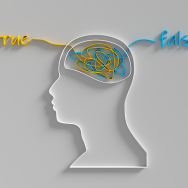If someone falls in front of you, your first instinct is probably to ask if they’re OK and help them up. But what if you’d heard them make a nasty comment? Or knew they voted differently than you? Would it change how you felt?
In a recent paper published in Cognition, a team of researchers from UChicago and the University of California Santa Barbara examined whether we withhold compassion based on our moral judgments.
The tumultuous events of 2020—a global pandemic, the murder of George Floyd by police officers, mass protests—had researchers pondering fundamental questions about how we relate to each other as human beings.
“It made us think about how much we care about the suffering of people who may not share our membership or we think may not have good moral standing,” said UChicago Research Asst. Prof. Fan Yang, who studies how we can live a good life in her Human Nature and Potentials Lab. “Do we just ignore their suffering? Do we actually think that they deserve to suffer?”
Studies show that people feel less compassion when they think someone is responsible for their own suffering (see: Twitter during the Titanic submersible tragedy). But researchers were curious about the effects of moral judgment on compassion—even when the sufferer wasn’t responsible for their woes.
Looking across four randomized studies, the research team found that we don’t extend compassion—or help—to those perceived to have immoral intention, character or group membership. They also found that we believe these people deserve to suffer.
“Knowing that compassion also has a limit can help us demystify it and keep a vigilant eye on it,” said first author Hongbo Yu, who leads the Yu Emotion Science Lab at UC Santa Barbara. “Oftentimes compassion is a good thing and can motivate prosociality and altruism, but it can also be misused, intentionally or unintentionally.”
Testing the limits of compassion
Compassion is concern for the suffering or misfortune of others. It has huge potential as a catalyst to alleviating suffering in many sectors of our lives, possibly even more than empathy. Empathy, the ability to feel someone else’s emotions, often relies on identifying with a particular individual.
Compassion is easier to extend to all humans. That’s why limits to it are concerning.
Researchers conducted four studies looking at how participants responded to immoral vs. neutral intention, character and group membership. Participants were presented with several randomized scenarios, which teased apart both moral judgements and causality, or whether the sufferer’s “moral badness” caused their own suffering.
For example, in study two a co-worker who’d previously made racist comments is let go from a company. In one version, they are terminated for their racist behavior. In another they are laid off for budget reasons. In both cases, the co-worker’s racism, or bad moral character, yielded a drop in compassion regardless of cause.
“So, even if the person has a bad intention for someone else, that intention didn't directly cause their own suffering, which makes people's unwillingness to offer compassion more surprising,” Yang said.
Researchers then turned to something even less black-and-white—group membership. In study three, the team surveyed people who self-identified on opposite ends of the political spectrum. They presented them with randomized scenarios featuring politically neutral and politically opposite sufferers.
Though the effect was smaller than in previous studies, those who merely belonged to a different “morally bad” group elicited less compassion and help.
Across all the studies, people's judgment about deservingness held steady. “We found that people do not think everybody deserves compassion,” Yang said. “They actually reserve compassion only for people who they think have good moral character and moral status.”
A hopeful reminder
So, we withhold compassion and feel morally justified in doing so. Where do we go from here? The research team offers one idea to tackle our compassion deficit—a counter narrative.
Yang explained that humans often have conflicting moral beliefs, even if we aren’t fully conscious of them. The researchers believe the best way to intervene is to offer a similar strong moral belief—that we are all human and make mistakes.
For the future, Yu also suggests a deeper dive into the link between moral justifications and lack of effort to drum up compassion. “Could it be the case that people are too lazy to show compassion, so that find a moral excuse to make themselves feel good?” Yu asked.
“I hope even just recognizing this barrier can make us think twice when we hesitate to offer compassion to someone,” Yang said. “Is this the most positive thing we can do to that person? Does this person not deserve dignified and compassionate treatment? If we reflect on these questions, maybe we will have a different answer than our immediate reactions.”












 —Prof. Chuan He
—Prof. Chuan He
